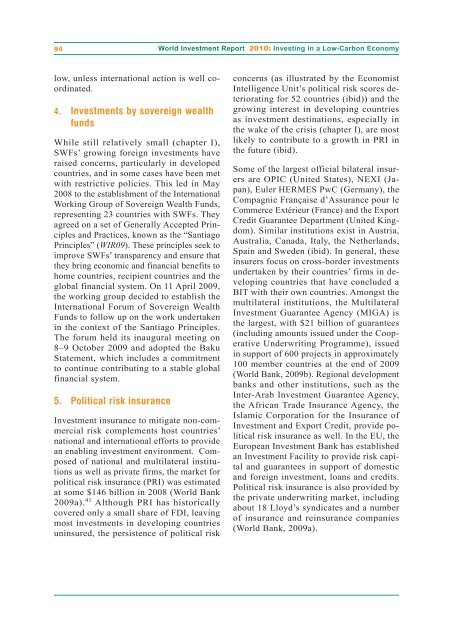UN World Investment Report 2010 - Office of Trade Negotiations
UN World Investment Report 2010 - Office of Trade Negotiations
UN World Investment Report 2010 - Office of Trade Negotiations
Create successful ePaper yourself
Turn your PDF publications into a flip-book with our unique Google optimized e-Paper software.
94<br />
low, unless international action is well coordinated.<br />
4. <strong>Investment</strong>s by sovereign wealth<br />
funds<br />
While still relatively small (chapter I),<br />
SWFs’ growing foreign investments have<br />
raised concerns, particularly in developed<br />
countries, and in some cases have been met<br />
with restrictive policies. This led in May<br />
2008 to the establishment <strong>of</strong> the International<br />
Working Group <strong>of</strong> Sovereign Wealth Funds,<br />
representing 23 countries with SWFs. They<br />
agreed on a set <strong>of</strong> Generally Accepted Principles<br />
and Practices, known as the “Santiago<br />
Principles” (WIR09). These principles seek to<br />
improve SWFs’ transparency and ensure that<br />
they bring economic and financial benefits to<br />
home countries, recipient countries and the<br />
global financial system. On 11 April 2009,<br />
the working group decided to establish the<br />
International Forum <strong>of</strong> Sovereign Wealth<br />
Funds to follow up on the work undertaken<br />
in the context <strong>of</strong> the Santiago Principles.<br />
The forum held its inaugural meeting on<br />
8–9 October 2009 and adopted the Baku<br />
Statement, which includes a commitment<br />
to continue contributing to a stable global<br />
financial system.<br />
5. Political risk insurance<br />
<strong>Investment</strong> insurance to mitigate non-commercial<br />
risk complements host countries’<br />
national and international efforts to provide<br />
an enabling investment environment. Composed<br />
<strong>of</strong> national and multilateral institutions<br />
as well as private firms, the market for<br />
political risk insurance (PRI) was estimated<br />
at some $146 billion in 2008 (<strong>World</strong> Bank<br />
2009a). 41 Although PRI has historically<br />
covered only a small share <strong>of</strong> FDI, leaving<br />
most investments in developing countries<br />
uninsured, the persistence <strong>of</strong> political risk<br />
<strong>World</strong> <strong>Investment</strong> <strong>Report</strong> <strong>2010</strong>: Investing in a Low-Carbon Economy<br />
concerns (as illustrated by the Economist<br />
Intelligence Unit’s political risk scores deteriorating<br />
for 52 countries (ibid)) and the<br />
growing interest in developing countries<br />
as investment destinations, especially in<br />
the wake <strong>of</strong> the crisis (chapter I), are most<br />
likely to contribute to a growth in PRI in<br />
the future (ibid).<br />
Some <strong>of</strong> the largest <strong>of</strong>ficial bilateral insurers<br />
are OPIC (United States), NEXI (Japan),<br />
Euler HERMES PwC (Germany), the<br />
Compagnie Française d’Assurance pour le<br />
Commerce Extérieur (France) and the Export<br />
Credit Guarantee Department (United Kingdom).<br />
Similar institutions exist in Austria,<br />
Australia, Canada, Italy, the Netherlands,<br />
Spain and Sweden (ibid). In general, these<br />
insurers focus on cross-border investments<br />
undertaken by their countries’ firms in developing<br />
countries that have concluded a<br />
BIT with their own countries. Amongst the<br />
multilateral institutions, the Multilateral<br />
<strong>Investment</strong> Guarantee Agency (MIGA) is<br />
the largest, with $21 billion <strong>of</strong> guarantees<br />
(including amounts issued under the Cooperative<br />
Underwriting Programme), issued<br />
in support <strong>of</strong> 600 projects in approximately<br />
100 member countries at the end <strong>of</strong> 2009<br />
(<strong>World</strong> Bank, 2009b). Regional development<br />
banks and other institutions, such as the<br />
Inter-Arab <strong>Investment</strong> Guarantee Agency,<br />
the African <strong>Trade</strong> Insurance Agency, the<br />
Islamic Corporation for the Insurance <strong>of</strong><br />
<strong>Investment</strong> and Export Credit, provide political<br />
risk insurance as well. In the EU, the<br />
European <strong>Investment</strong> Bank has established<br />
an <strong>Investment</strong> Facility to provide risk capital<br />
and guarantees in support <strong>of</strong> domestic<br />
and foreign investment, loans and credits.<br />
Political risk insurance is also provided by<br />
the private underwriting market, including<br />
about 18 Lloyd’s syndicates and a number<br />
<strong>of</strong> insurance and reinsurance companies<br />
(<strong>World</strong> Bank, 2009a).

















